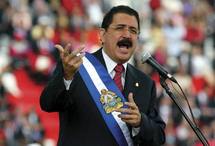
Zelaya flew to Washington following two days of failed negotiations in San Jose with the government of interim leader Roberto Micheletti government mediated by Costa Rican President Oscar Arias.
Arias, who won the 1987 Nobel Peace Prize for helping resolving bloody civil wars in Central America, suggested follow-up talks in about a week after Zelaya and Micheletti refused to meet face-to-face on Thursday.
Zelaya has proposed that the next round of negotiations be held in Honduras. Zelaya was denied entry to Honduras when the interim government refused to allow his aircraft to land last week.
Micheletti imposed the curfew following the coup last month that seated him in Zelaya's place, saying the measure was needed to restore calm.
"By virtue of having reached the objectives of this regulation, the government announces that from Sunday, July 12, the curfew is lifted across the entire country," said a statement broadcast on Honduran television and radio.
Curfew or not, Zelaya supporters vowed to continue their protest marches and road blockades demanding that their leader be reinstated.
"We are going to continue the protests," said Luis Sosa, a leader of the anti-government Popular Bloc. "Our commitment is to maintain them permanently until the democratic process is restored," Sosa told AFP.
In Washington, Zelaya met with the top US official for Latin America, Thomas Shannon, and OAS head Jose Miguel Insulza.
Rodolfo Pastor, a Honduran embassy official loyal to Zelaya, told AFP that the meeting was "part of the ongoing negotiations" for the ousted leader's return to power.
The foreign minister of Zelaya's deposed administration was less than sanguine about the talks -- even as she suggested that the ousted government was interested in continuing the process.
"It's a chance for each side to see what the other side is thinking," said foreign minister Patricia Rodas, speaking to the Caracas-based Telesur regional news channel from Washington, where she was accompanying Zelaya.
However she added: "It's not a dialogue between two equal parties, but an exchange of information between a criminal on the one hand, and a totally legitimate government on the other hand."
In Honduras, journalists from Venezuela-based regional television network Telesur accused Micheletti's government of harassment.
"It is a clear case of intimidation against Telesur," said Madelein Garcia, a Telesur journalist who sought refuge in the Venezuelan embassy in Tegucigalpa.
A Honduran government official denied the accusations and told AFP that police questioned several Telesur employees about their immigration status.
Micheletti's backers on Saturday organized a massive prayer for peace in the capital's baseball stadium, backed by the Catholic Church, evangelical groups and the local Jewish community.
Zelaya, a wealthy rancher who moved sharply left after taking office in January 2006, rattled his country's ruling elite by trying to bypass Congress to hold a referendum on rewriting the constitution.
He has denied charges that the move was a bid to lift the one-term presidential limit so he could seek re-election this year.
--------------------------------------------------------------------------------------------------------------------------
Arias, who won the 1987 Nobel Peace Prize for helping resolving bloody civil wars in Central America, suggested follow-up talks in about a week after Zelaya and Micheletti refused to meet face-to-face on Thursday.
Zelaya has proposed that the next round of negotiations be held in Honduras. Zelaya was denied entry to Honduras when the interim government refused to allow his aircraft to land last week.
Micheletti imposed the curfew following the coup last month that seated him in Zelaya's place, saying the measure was needed to restore calm.
"By virtue of having reached the objectives of this regulation, the government announces that from Sunday, July 12, the curfew is lifted across the entire country," said a statement broadcast on Honduran television and radio.
Curfew or not, Zelaya supporters vowed to continue their protest marches and road blockades demanding that their leader be reinstated.
"We are going to continue the protests," said Luis Sosa, a leader of the anti-government Popular Bloc. "Our commitment is to maintain them permanently until the democratic process is restored," Sosa told AFP.
In Washington, Zelaya met with the top US official for Latin America, Thomas Shannon, and OAS head Jose Miguel Insulza.
Rodolfo Pastor, a Honduran embassy official loyal to Zelaya, told AFP that the meeting was "part of the ongoing negotiations" for the ousted leader's return to power.
The foreign minister of Zelaya's deposed administration was less than sanguine about the talks -- even as she suggested that the ousted government was interested in continuing the process.
"It's a chance for each side to see what the other side is thinking," said foreign minister Patricia Rodas, speaking to the Caracas-based Telesur regional news channel from Washington, where she was accompanying Zelaya.
However she added: "It's not a dialogue between two equal parties, but an exchange of information between a criminal on the one hand, and a totally legitimate government on the other hand."
In Honduras, journalists from Venezuela-based regional television network Telesur accused Micheletti's government of harassment.
"It is a clear case of intimidation against Telesur," said Madelein Garcia, a Telesur journalist who sought refuge in the Venezuelan embassy in Tegucigalpa.
A Honduran government official denied the accusations and told AFP that police questioned several Telesur employees about their immigration status.
Micheletti's backers on Saturday organized a massive prayer for peace in the capital's baseball stadium, backed by the Catholic Church, evangelical groups and the local Jewish community.
Zelaya, a wealthy rancher who moved sharply left after taking office in January 2006, rattled his country's ruling elite by trying to bypass Congress to hold a referendum on rewriting the constitution.
He has denied charges that the move was a bid to lift the one-term presidential limit so he could seek re-election this year.
--------------------------------------------------------------------------------------------------------------------------









 Home
Home Politics
Politics









